SWEDISH
SOUTH ASIAN STUDIES NETWORK
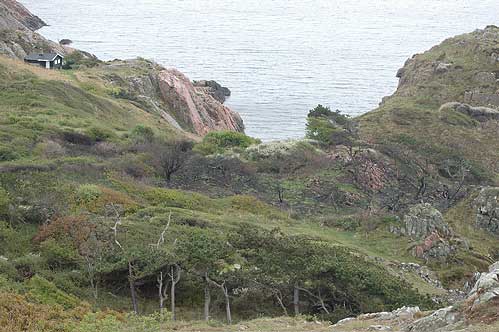
Newsletter 62:
24 May 2006
| SASNET News | Community News |
| Educational news | Winter schools |
| Conferences and workshops | Important lectures and seminars |
| Cultural activities | New items on the web site |
 • Announcement
for SASNET Director
• Announcement
for SASNET Director
The
position as Director of SASNET – Swedish South Asian Studies
Network, based at Lund University is hereby announced for the period
1 January 2007 to 31 December 2009. The position is 50 % of
full time. The Director should be a highly qualified South Asia researcher,
university teacher, supervisor, administrator and programme builder,
with well established research contacts in, and familiarity with the
South Asian region. She/he should have position in a Swedish academic
institution, and young applicants are especially invited. The Director
is expected to spend most of his working time at the root node in Lund.
Last date for application is 15 June 2006. More
information.
• Time
to apply for three forms of SASNET grants
Applications for the next
round of SASNET
planning grants are
now invited. In addition to the existing Networking grants for
planning and continued activities in research and education programmes/projects
SASNET now introduces two other forms of grants: Interdisciplinary
Workshop Grants for organising an interdisciplinary South Asia
related research workshop in Sweden or in South Asia; and a Guest
Lecture Programme, offering grants for inviting a guest lecturer
from South Asia, to give lectures at more than one Swedish university.
Closing date for applications is 15 June 2006. More
information about the new SASNET grants.
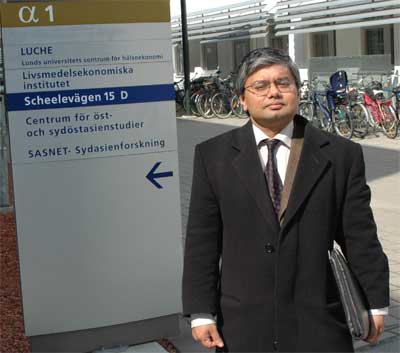 • Kunal
Sen visited Lund to discuss the ANERI project
• Kunal
Sen visited Lund to discuss the ANERI project
The European Commission
has decided to launch an Academic Network for European Research related
to India (ANERI).
The project aims to strengthen the ties between the European Union
and India, and seeks to promote funding for specific types of India-focused
research within the field of contemporary social science. It might
result in the setting up of a European Centre for Indian Studies. The
project is prepared by a team consisting of Dr Willem van der Geest,
European Institute for Asian Studies (EIAS) in Brussels (team leader),
Dr Kunal Sen, University of East Anglia, UK (as economic analyst),
and Dr Lawrence Saez, London School of Economics, UK (as political
analyst). They currently visit institutions and meet researchers all
over Europe in order to work out a strategy for the network. On Wednesday
3 May 2006 Dr. Kunal Sen (photo above) came to Lund for a
fruitful meeting with SASNET’s
Staffan Lindberg and Lars Eklund. Together they discussed the role
SASNET and Swedish researchers could possibly play in the further development
of ANERI. More
details about the ANERI project.
• SASNET lecture by Sucha Singh
Gill, guest professor at Lund University
During June 2006 Prof. Sucha Singh
Gill from the Punjabi University, Patiala, India,will be a is guest professor
at the Nordic Institute of Asian Studies in Copenhagen, and at the Department
of Sociology, Lund University. On
Wednesday 7 June 2006, 15.15–17.00, he will hold a SASNET lecture
at Lund University, about ”Marginalised
Peasantry Seeking Safe Exit in India in the Era of Globalisation”.
Prof. Gill is professor of Economics at the Punjabi University
and is a leading expert on agriculture and rural development. He has
written extensively on agricultural economics and change, land reforms,
resources mobilisation and farmers movements. In 2001 he authored ”Land
Reforms in India, Vol. 6: Intervention for Capitalist Transformation
in Punjab and Haryana”. Venue for the lecture: Dept.
of Sociology, Paradisgatan 5, Conference room 335, 2nd floor, Lund. More
information.
• SASNET
meeting with Tejaswini Niranjana
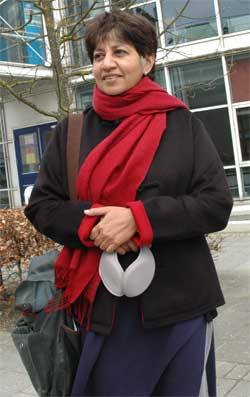 During the first week of May 2006 Tejaswini
Niranjana, Director for the Centre for the Study of Culture and Society
in Bangalore, India, visited Roskilde University in Denmark to
participate in the PhD Researcher Training
Course on ”Postcolonial sexualities: Politics and discourses”.
Besides heading the well reputed research centre in Bangalore Dr. Niranjana
has for many years studied the Indian Diaspora in the Carribean, especially
Trinidad. In Roskilde she lectured about ”Indian Nationalisms
and the Sexuality Question: History and the Present in India and Trinidad”.
In an open one-day seminar titled ”Situating Postcolonial
Sexualities”, held on Tuesday 2 May 2006, she also lectured
about ”Music, Race and Sexuality in Contemporary Trinidad”.
Staffan Lindberg and Lars Eklund from SASNET crossed Öresund to
listen to her presentation in Roskilde. After that they went together
with Dr. Niranjana to Copenhagen, and had a fruitful meeting over dinner,
discussing possible links to establish between her institution in Bangalore
with Swedish researchers. More information
about the Centre for the Study of Culture and Society.
During the first week of May 2006 Tejaswini
Niranjana, Director for the Centre for the Study of Culture and Society
in Bangalore, India, visited Roskilde University in Denmark to
participate in the PhD Researcher Training
Course on ”Postcolonial sexualities: Politics and discourses”.
Besides heading the well reputed research centre in Bangalore Dr. Niranjana
has for many years studied the Indian Diaspora in the Carribean, especially
Trinidad. In Roskilde she lectured about ”Indian Nationalisms
and the Sexuality Question: History and the Present in India and Trinidad”.
In an open one-day seminar titled ”Situating Postcolonial
Sexualities”, held on Tuesday 2 May 2006, she also lectured
about ”Music, Race and Sexuality in Contemporary Trinidad”.
Staffan Lindberg and Lars Eklund from SASNET crossed Öresund to
listen to her presentation in Roskilde. After that they went together
with Dr. Niranjana to Copenhagen, and had a fruitful meeting over dinner,
discussing possible links to establish between her institution in Bangalore
with Swedish researchers. More information
about the Centre for the Study of Culture and Society.
• Kolkata
journalists visited SASNET’s root node office
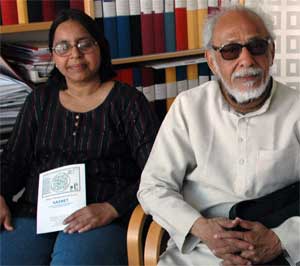 Kusum Jain and Geetesh
Sharma (photo
to the right),
journalists, poets as well as social activists from Kolkata, India,
visited SASNET’s
root node office in Lund on Monday 8 May 2006. They have a
long-standing relation to Sweden, being partly involved in the Indo-Swedish
translation project. In 1995 they also published a book titled ”Double
Fantasy” in collaboration with the Swedish writer Tomas
Andersson. The main purpose of their current visit to Sweden is to
participate in a conference with the Green Party of Sweden to be held
in Borås, but they will also among other things visit Indian
associations in Göteborg and Oslo, Norway. Mr. Sharma has recently
published a book titled ”Whither Secularism” (Dialogue
Society 2006), about how a crisis ridden Indian society may overcome
its problems. Ms. Jain is President of the organsiation Women’s
Sahayog, based in Kolkata.
Kusum Jain and Geetesh
Sharma (photo
to the right),
journalists, poets as well as social activists from Kolkata, India,
visited SASNET’s
root node office in Lund on Monday 8 May 2006. They have a
long-standing relation to Sweden, being partly involved in the Indo-Swedish
translation project. In 1995 they also published a book titled ”Double
Fantasy” in collaboration with the Swedish writer Tomas
Andersson. The main purpose of their current visit to Sweden is to
participate in a conference with the Green Party of Sweden to be held
in Borås, but they will also among other things visit Indian
associations in Göteborg and Oslo, Norway. Mr. Sharma has recently
published a book titled ”Whither Secularism” (Dialogue
Society 2006), about how a crisis ridden Indian society may overcome
its problems. Ms. Jain is President of the organsiation Women’s
Sahayog, based in Kolkata.
• Swedish
support to research projects related to Sexual and Reproductive Health
in India
![]() In March 2005 the Swedish Government decided on a new country
strategy for India for the period 2005-2009.
The strategy implies a new kind of co-operation between Sweden in India
mainly focusing on technical assistance and building partnerships of
mutual interests between Swedish and Indian actors. The focus areas
are: Respect for democracy and human rights; Environmental protection
that will benefit the poor; and Scientific cooperation in selected
areas that will benefit the poor. In light of the comparative advantage
that Sweden has in Sexual and Reproductive Health & Rights, Children's
Rights and HIV/AIDS, the Swedish International Development Cooperation
Agency, Sida, now therefore supports and allocates funds to a number
of projects and partnerships involving Swedish universities.
In March 2005 the Swedish Government decided on a new country
strategy for India for the period 2005-2009.
The strategy implies a new kind of co-operation between Sweden in India
mainly focusing on technical assistance and building partnerships of
mutual interests between Swedish and Indian actors. The focus areas
are: Respect for democracy and human rights; Environmental protection
that will benefit the poor; and Scientific cooperation in selected
areas that will benefit the poor. In light of the comparative advantage
that Sweden has in Sexual and Reproductive Health & Rights, Children's
Rights and HIV/AIDS, the Swedish International Development Cooperation
Agency, Sida, now therefore supports and allocates funds to a number
of projects and partnerships involving Swedish universities.
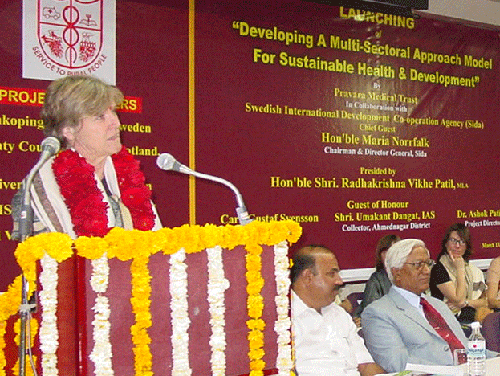 The
Faculty of Health Sciences, Linköping University, and the Department
of Health Sciences and Nature, Skövde University get substantial
support for their collaboration project with Pravara Institute of Medical Sciences
in Loni. The project is titled ”Developing a multi-sectoral approach
model to sustainable health and development through institutional collaboration
between India and Sweden”. It was formally launced on 13 March 2006
when Maria Norrfalk, Director General of Sida, visited the project run in India
(see photo from Ms. Norrfalk’s visit) (more
information about the project).
The
Faculty of Health Sciences, Linköping University, and the Department
of Health Sciences and Nature, Skövde University get substantial
support for their collaboration project with Pravara Institute of Medical Sciences
in Loni. The project is titled ”Developing a multi-sectoral approach
model to sustainable health and development through institutional collaboration
between India and Sweden”. It was formally launced on 13 March 2006
when Maria Norrfalk, Director General of Sida, visited the project run in India
(see photo from Ms. Norrfalk’s visit) (more
information about the project).
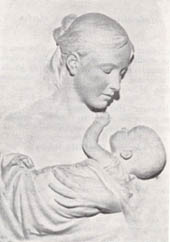 International
Maternal and Child Health (IMCH), Department of Women’s and Children’s
Health, Uppsala University, is involved in two major projects; ”Integrating
social support for reproductive and child health and rights, Phase
II” (more information);
and ”Increasing Access to Comprehensive Abortion Care
Services in India” (more
information); and the Division for Reproductive
and Perinatal Health, Department of Woman and Child Health,
Karolinska Institutet Medical University, Stockholm, is involved
in another Sida funded project titled ”Developing inter-institutional
collaboration between institutions in India and Sweden for improving
midwifery and emergency obstetric care services in India” (more
information).
International
Maternal and Child Health (IMCH), Department of Women’s and Children’s
Health, Uppsala University, is involved in two major projects; ”Integrating
social support for reproductive and child health and rights, Phase
II” (more information);
and ”Increasing Access to Comprehensive Abortion Care
Services in India” (more
information); and the Division for Reproductive
and Perinatal Health, Department of Woman and Child Health,
Karolinska Institutet Medical University, Stockholm, is involved
in another Sida funded project titled ”Developing inter-institutional
collaboration between institutions in India and Sweden for improving
midwifery and emergency obstetric care services in India” (more
information).
• 2006 Linnaus Palme grants
given to 24 collaboration projects with South Asian partners
SASNET
has presented a list of the 24 educational South Asia related programmes
that have been given Linnaus Palme grants for 2006-07.
The sixth round of applications for Linnaus Palme grants, for the contract
period 1 July 2006–
30 June 2007, were decided upon by the International Programme Office
for Education and Training on 8 May 2006. Four of the programmes are
new for this year. See SASNET’s list
of South Asia related projects 2006.
• Research cooperation agreement between
India and Sweden
In December 2005 India and Sweden signed a five-year
research cooperation agreement. Since then Vinnova (the
Swedish Governmental Agency for Innovation Systems) in Stockholm has
been given the task to develop applied research projects with participation
of both Indian and Swedish researchers and private companies. The research
will focus on biotechnology and ICT-technology, especially E-governance.
The programme is currently being planned by Vinnova in cooperation with
Sida, and various ministries in India and Sweden. Some seminars and workshops
will be part of it in order to promote the programme. The first seminar
was the so-called 'Indo-Swedish workshop on Innovations in
Life sciences' held 4–5 March 2006 at the Indian Institute of Science campus
in Bangalore. This workshop, organised in collaboration with Karolinska Institutet
Medical University, was attended by 25 Swedish experts and 50 Indian experts
in the field of Infectious Medicine (HIV, Malaria and Tuberculosis), Cardiovascular
Medicine and Metabolic diseases. More information
about this workshop.
 •
Prof. Sujata Patel holds the keynote lecture at the 19th ECMSAS
conference in Leiden
•
Prof. Sujata Patel holds the keynote lecture at the 19th ECMSAS
conference in Leiden
The 19th European Conference on Modern
South Asian Studies (ECMSAS) will be held 27–30
June 2006 in Leiden, the Netherlands.
A list of the 49 panels approved for the conference is also
available – go
for the panels list. The keynote lecture, titled ”Is
there a South Asia? Beyond Colonial Modernity and its Binaries” will
be given by Prof. Sujata Patel of the Sociology Department
of the University of Pune, India.
On one of the conference days a special roundtable will be held in the framework
of the newly established research programme ”Illegal but Licit: Transnational
Flows and Permissive Polities in Asia”. The roundtable is organized by
Prof. Willem van Schendel (University of Amsterdam and International Institute
for Social History) and Dr Sikko Visscher (University of Amsterdam/Asian Studies
in Amsterdam). The conference will be held in Leiden University’s Lipsius
Building at Cleveringaplaats 1.
SASNET will be represented at the conference both by Prof. Staffan Lindberg (chairing
panel No. 32 on ”Post Green Revolution Agrarian Transformation in South
Asia: Ecology and Peasant Life under Globalization”) and by Lars Eklund. More
information on the conference web site.
• Doctoral dissertation
in Oslo about changing consumption in Kerala
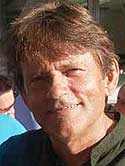 Harold
Wilhite, Research Fellow at the Centre for Development and the Environment
(SUM), University of Oslo, Norway, will defend his doctoral thesis,
titled
”Why is consumption changing in Kerala? An ethnographic approach”,
on Friday 2 June 2006, 13.15. Before that, at 10.15 he will give his
trial lecture about ”Everyday technologies and the transformation
of life worlds”. The thesis deals with cross-cultural perspectives
from India and Norway on consumption, socio-cultural change and sustainability.
It tries to develop a policy-relevant theory of consumption which takes
due account of the socio-cultural dynamics of change. Indian findings
are compared with Norwegian consumption practices in order to highlight
important socio-cultural determinants of consumption such as comfort,
identity, time use and notions of the "good life". Venue: Auditorium
2, Georg Sverdrups hus, Oslo. More
information.
Harold
Wilhite, Research Fellow at the Centre for Development and the Environment
(SUM), University of Oslo, Norway, will defend his doctoral thesis,
titled
”Why is consumption changing in Kerala? An ethnographic approach”,
on Friday 2 June 2006, 13.15. Before that, at 10.15 he will give his
trial lecture about ”Everyday technologies and the transformation
of life worlds”. The thesis deals with cross-cultural perspectives
from India and Norway on consumption, socio-cultural change and sustainability.
It tries to develop a policy-relevant theory of consumption which takes
due account of the socio-cultural dynamics of change. Indian findings
are compared with Norwegian consumption practices in order to highlight
important socio-cultural determinants of consumption such as comfort,
identity, time use and notions of the "good life". Venue: Auditorium
2, Georg Sverdrups hus, Oslo. More
information.
• Doctoral dissertation
in Lund about Salman Rushdies book ”The Satanic Verses”
Mats Bergenhorn from
the Division
for Islamology, Centre for Theology and Religious Studies, Lund
University, will defend his his doctoral dissertation titled ”Öppna
universum! Slutna traditioner i Salman Rushdies Satansverserna”
(Open the Universe. Secluded Traditions in Salman Rushdie’s
’Satanic Verses’), on Wednesday 7 June 2006, 14.15. The thesis
contains discussions about Hindutva, migration and ethnicity, especially
in the United Kingdom. Faculty Opponent is Thomas Hylland Eriksen, Dept.
of Social Anthropology, University of Oslo. Venue: Hörsalen Spoletorp,
Lund.
• Doctoral dissertation in Stockholm
about the 1990s anti-arrack campaign in Andhra Pradesh
Marie Larsso from the Dept. of Social Anthropology,
Stockholm University, will defend her doctoral dissertation titled ”When
Women Unite!. The Making of the Anti-Liquor Movement in Andhra Pradesh,
India” on Friday 9 June 2006, 10.00. Originally it should
have been presented a month earlier, was the dissertation has to be moved
due to unexpected circumstances. The thesis deals with the anti-arrack
campaign started in the early 1990s among poor village women in Andhra
Pradesh in Southern India, primarily among Scheduled Castes (formerly
Untouchables) and Muslims. Faculty opponent will be Prof. Shalini Randeria,
Ethnologisches Seminar, Universität Zurich, Switzerland. Venue:
Auditorium B 4, Universitetsvägen 10, Stockholm University, Frescati. Read
the abstract.
• Göteborg
seminar in honour of Björn Hettne when he retires
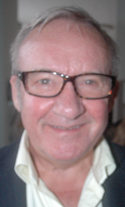 In
June 2006 eminent Swedish South Asia researcher Professor Björn
Hettne, Dept. of Peace and Development Research (PADRIGU), School of
Global Studies, Göteborg University, retires from his position.
Prof. Hettne, who is also Chairman of SASNET’s board, has been
working on International studies since the 1970’s. In his honour,
Göteborg University arranges a seminar (for invited guests only)
at Jonsered Manor 14–15 June 2006. The seminar is titled ”New
Scenes for International Cooperation – Björn Hettne and
Internationalisation of Higher Education”. Professor S.
D. Muni, Centre of South, Central & South East Asian Studies at
Jawaharlal Nehru University, New Delhi, India, will be one of the keynote
speakers at the seminar.
In
June 2006 eminent Swedish South Asia researcher Professor Björn
Hettne, Dept. of Peace and Development Research (PADRIGU), School of
Global Studies, Göteborg University, retires from his position.
Prof. Hettne, who is also Chairman of SASNET’s board, has been
working on International studies since the 1970’s. In his honour,
Göteborg University arranges a seminar (for invited guests only)
at Jonsered Manor 14–15 June 2006. The seminar is titled ”New
Scenes for International Cooperation – Björn Hettne and
Internationalisation of Higher Education”. Professor S.
D. Muni, Centre of South, Central & South East Asian Studies at
Jawaharlal Nehru University, New Delhi, India, will be one of the keynote
speakers at the seminar.
• Columbia
University multimedia presentation
of Dr. Ambedkar's famous work
 The
Columbia Center for New Media Teaching and Learning (CCNMTL) in New
York USA enhances teaching and learning through the purposeful use
of new media. CCNMTL
builds course web sites to develop advanced projects that act as demonstrations
and explorations of pedagogical and curricular possibility. One such
South Asia related project recently published is a multimedia presentation
of Dr. B. R. Ambedkar's famous ”The Annihilation of Caste” presentation.
Ambedkar was the first highly educated (Ph.D., Columbia University),
politically prominent member of the Hindu "Untouchable" castes.,
and wrote this paper for the 1936 meeting of a group of liberal Hindu
caste-reformers in Lahore. After reviewing the speech, conference organizers
revoked Dr. Ambedkar's invitation. He then self-published the work,
which became an immediate classic. It is now being edited for classroom
use by Fran Pritchett; with explanatory annotations; and several other
major texts by Dr. Ambedkar. Faculty interview videos have also been
added and a timeline created. Go
for the Ambedkar project.
The
Columbia Center for New Media Teaching and Learning (CCNMTL) in New
York USA enhances teaching and learning through the purposeful use
of new media. CCNMTL
builds course web sites to develop advanced projects that act as demonstrations
and explorations of pedagogical and curricular possibility. One such
South Asia related project recently published is a multimedia presentation
of Dr. B. R. Ambedkar's famous ”The Annihilation of Caste” presentation.
Ambedkar was the first highly educated (Ph.D., Columbia University),
politically prominent member of the Hindu "Untouchable" castes.,
and wrote this paper for the 1936 meeting of a group of liberal Hindu
caste-reformers in Lahore. After reviewing the speech, conference organizers
revoked Dr. Ambedkar's invitation. He then self-published the work,
which became an immediate classic. It is now being edited for classroom
use by Fran Pritchett; with explanatory annotations; and several other
major texts by Dr. Ambedkar. Faculty interview videos have also been
added and a timeline created. Go
for the Ambedkar project.
• Journal
of South Asian Development (JSAD) now fully available online
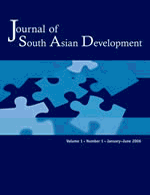 The
peer-reviewed Journal of South Asian Development (JSAD) is now fully
available online. The biannual magazine is published by Sage India
and distributed worldwide. It is edited by Rajat Ganguly, Senior Lecturer
in Politics & International Studies at the School of Development
Studies, University of East Anglia, Norwich, UK. The first volume came
out in April 2006, and includes articles by Pranab Bardhan about ”Awakening
Giants, Feet of Clay: A Comparative Assessment of the Rise of China
and India”; by Premachandra Athukorala about ”Outward-oriented
Policy Reforms and Industrialisation: The Sri Lankan Experience”;
Raymond C. Taras about ”Rising Insurgency, Faltering Democratisation
in Nepal”
and Joseph Devine about ”NGOs, Politics and Grassroots Mobilisation:
Evidence from Bangladesh”. More
information.
The
peer-reviewed Journal of South Asian Development (JSAD) is now fully
available online. The biannual magazine is published by Sage India
and distributed worldwide. It is edited by Rajat Ganguly, Senior Lecturer
in Politics & International Studies at the School of Development
Studies, University of East Anglia, Norwich, UK. The first volume came
out in April 2006, and includes articles by Pranab Bardhan about ”Awakening
Giants, Feet of Clay: A Comparative Assessment of the Rise of China
and India”; by Premachandra Athukorala about ”Outward-oriented
Policy Reforms and Industrialisation: The Sri Lankan Experience”;
Raymond C. Taras about ”Rising Insurgency, Faltering Democratisation
in Nepal”
and Joseph Devine about ”NGOs, Politics and Grassroots Mobilisation:
Evidence from Bangladesh”. More
information.
• Documentary
films about Dalits in India and Nepal shown in Danish TV
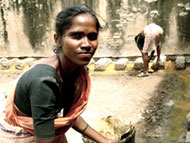 During the
period 8 May–14 June 2006, the Danish Radio broadcasts a
documentary series of five TV programmes on Dalits in India and Nepal.
Text (in Danish) plus photos and video clippings from the programmes
also appear on an impressive sub site of the DR web site, http://www.dr.dk/uroerlige/da/forside/.
The first programme is a shocking story about manual scavengers in
India, and other programmes focus on items such as prostitution among
badi women in Nepal, debt slavery, the jogini tradition in South India,
and caste violence in Bihar. Go
for the photo series, and the video
clippings.
During the
period 8 May–14 June 2006, the Danish Radio broadcasts a
documentary series of five TV programmes on Dalits in India and Nepal.
Text (in Danish) plus photos and video clippings from the programmes
also appear on an impressive sub site of the DR web site, http://www.dr.dk/uroerlige/da/forside/.
The first programme is a shocking story about manual scavengers in
India, and other programmes focus on items such as prostitution among
badi women in Nepal, debt slavery, the jogini tradition in South India,
and caste violence in Bihar. Go
for the photo series, and the video
clippings.
• Swiss coordinated research
project about legal issues related to Water Sector Restructuring
The
International Environmental Law Research Centre (IELRC), Geneva, Switzerland,
is currently implementing a 3-year research project entitled
'Legal Issues Related to Water Sector Restructuring: Human Rights,
Environment, Agriculture and Socio-Economic Aspects'. This project
is coordinated by Dr Philippe Cullet in Geneva and Dr Usha Ramanathan
from the Centre for the Study of Developing Societies, New Delhi,
India. Other research partners are based at the National Law School
of India University in Bangalore, and the Tata Institute of Social
Sciences in Mumbai. The project is supported by the Swiss National
Science Foundation. In pursuance of this research project, a workshop
entitled "Water, Law and the Commons" will
be arranged 8–10 December 2006, in New Delhi. More
information about this project.
• Pakistan sets up career placement offices in 25 top
universities to pick up talented IT graduates
On 3 May 2006 Pakistan Minister for Information Technology
Awais Ahmad Khan Leghari declared that his ministry had decided to
set up career placement offices in about 25 top universities
in the country to pick up talented IT graduates for their placement
in the industry. "These
youths will undergo extensive training-cum-internship at the leading
IT companies for a period of three years and the ministry would provide
50 per cent of the total cost that would include a monthly stipend." More
information.
• Time
to apply for competitive awards from the Asian Institute of Technology
 The
Asian Institute of Technology (AIT) in Bangkok, Thailand invites
for applications for competitive awards for Post-Graduate education
on Gender and Development Studies,
with a specialization in Gender, Environment and Development. Eligible
applicants should have an educational background in the social sciences
or human geography or any of the natural science disciplines as well
as career experience in organizations working with programs related
to natural resource management or environmental governance for a minimum
of three years. They should also be nationals of the following countries:
Indonesia, Malaysia, Thailand, Myanmar, Vietnam, Philippines, East
Timor, Cambodia, Lao PDR, China, Pakistan, India, Bangladesh, Nepal,
Sri Lanka and Bhutan. It is expected that grant awardees will develop
their master's thesis exploring various themes within the general framework
of social and gender analysis on natural environments in the Asian
region and with intended relevance to their organizations' objectives,
concerns and scope of work. Deadline for applications is 31 May 2006.
The
Asian Institute of Technology (AIT) in Bangkok, Thailand invites
for applications for competitive awards for Post-Graduate education
on Gender and Development Studies,
with a specialization in Gender, Environment and Development. Eligible
applicants should have an educational background in the social sciences
or human geography or any of the natural science disciplines as well
as career experience in organizations working with programs related
to natural resource management or environmental governance for a minimum
of three years. They should also be nationals of the following countries:
Indonesia, Malaysia, Thailand, Myanmar, Vietnam, Philippines, East
Timor, Cambodia, Lao PDR, China, Pakistan, India, Bangladesh, Nepal,
Sri Lanka and Bhutan. It is expected that grant awardees will develop
their master's thesis exploring various themes within the general framework
of social and gender analysis on natural environments in the Asian
region and with intended relevance to their organizations' objectives,
concerns and scope of work. Deadline for applications is 31 May 2006.
• Time
to apply for participation in the 2006 Winter Course on Forced Migration
in Kolkata
 The Annual Winter Course on Forced Migration is again held
in Kolkata, India, 1–15 December
2006.
The course is held by the Mahanirban Calcutta Research Group (MCRG),
popularly known as the Calcutta Research Group (CRG). This is public
policy forum by a group of researchers, trade unionists, feminist thinkers
and women's rights campaigners, academics, journalists, and lawyers,
and CRG has become well known for its research, dialogues, and advocacy
work in India and in the region of South Asia as a whole. The Winter
Course on Forced Migration is an outcome of the ongoing and past work
by the CRG, and other collaborating groups, institutions, scholars,
and human rights and humanitarian activists in the field of refugee
studies and the broad studies on displacement, human rights and humanitarian
work for the victims of forced displacement. The duration of the full
course is three months. A two and a half month long distance education
programme precedes the fifteen-day Kolkata workshop. The programme
is supported by the UNHCR, the Government of Finland, and the Brookings
Institution. Applications reaching before 31 May will be considered
for the course the same year. Applications reaching after that will
be considered for the following year’s
programme. More information.
The Annual Winter Course on Forced Migration is again held
in Kolkata, India, 1–15 December
2006.
The course is held by the Mahanirban Calcutta Research Group (MCRG),
popularly known as the Calcutta Research Group (CRG). This is public
policy forum by a group of researchers, trade unionists, feminist thinkers
and women's rights campaigners, academics, journalists, and lawyers,
and CRG has become well known for its research, dialogues, and advocacy
work in India and in the region of South Asia as a whole. The Winter
Course on Forced Migration is an outcome of the ongoing and past work
by the CRG, and other collaborating groups, institutions, scholars,
and human rights and humanitarian activists in the field of refugee
studies and the broad studies on displacement, human rights and humanitarian
work for the victims of forced displacement. The duration of the full
course is three months. A two and a half month long distance education
programme precedes the fifteen-day Kolkata workshop. The programme
is supported by the UNHCR, the Government of Finland, and the Brookings
Institution. Applications reaching before 31 May will be considered
for the course the same year. Applications reaching after that will
be considered for the following year’s
programme. More information.
Educational News
• Indian
government decides to introduce 27 per cent quota for OBC students
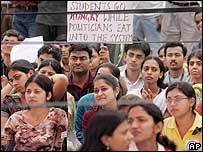 On
23 May 2006 the Indian government decided to implement a 27 per cent
quota for other backward classes (OBCs) in
higher educational institutions from the academic year beginning June
2007, while increasing seats for general-category students. A meeting
of the coordination committee of the United Progressive Alliance chose
to enforce the measure by introducing a bill in the monsoon session
of Parliament, which will begin sometime in July. The percentage of
reservation for OBCs will be fixed at 27 per cent, in addition to the
22.5% of college places already "reserved" for Dalits, or
untouchables, who are at the bottom of India's caste hierarchy, and
tribal students. The decision comes amidst large-scale protests from
medical students as well as business leaders and teachers all over
India, who fear that it may lead to a drop in standards. More
information.
On
23 May 2006 the Indian government decided to implement a 27 per cent
quota for other backward classes (OBCs) in
higher educational institutions from the academic year beginning June
2007, while increasing seats for general-category students. A meeting
of the coordination committee of the United Progressive Alliance chose
to enforce the measure by introducing a bill in the monsoon session
of Parliament, which will begin sometime in July. The percentage of
reservation for OBCs will be fixed at 27 per cent, in addition to the
22.5% of college places already "reserved" for Dalits, or
untouchables, who are at the bottom of India's caste hierarchy, and
tribal students. The decision comes amidst large-scale protests from
medical students as well as business leaders and teachers all over
India, who fear that it may lead to a drop in standards. More
information.
• Copenhagen Researcher-training course
on labour in developing countries
A Researcher-training course
on ”Globalisation
and the impact of outsourcing on firms, industries and labour in developing
countries” is arranged on Copenhagen 31 May–2
June 2006. The course is jointly organised by the Centre for Business
and Development Studies, Copenhagen Business School (CBS), and the
Dept. of International Development Studies, Roskilde University. It
iso pen to all PhD students. The aim of the course is to present and
discuss selected theoretical approaches to understand globalisation
and the impact of outsourcing on firms, industries and labour in developing
countries, discuss associated methodological issues and identify strategies
and policies at firm, sector, national and international level.
• Fifth International Convention of
Asia Scholars (ICAS 5) to be held in Kuala Lumpur
The Fifth International
Convention of Asia Scholars (ICAS 5) will be held in Kuala Lumpur,
Malaysa, 2–5 August 2006.
The theme for 2006 ICAS conference is 'Sharing a Future in Asia' ,
focusing on the fact that even though Asia is often proclaimed as the
fastest growing region in the world today, still nearly a billion of
its population live in poverty. The conference is organised by the
Institute of Occidental Studies (IKON), the Institute of The Malay
World and Civilization (ATMA), Universiti Kebangsaan Malaysia, and
the International Institute for Asian Studies (IIAS), University of
Leiden, the Netherlands. One of the keynote speakers is India born
Prof. Arjun Appadurai, Provost and Senior Vice President for Academic
Affairs at New School University in New York, USA. His most recent
book is ”Modernity at Large: Cultural Dimensions of Globalization” (1996,
University of Minnesota Press; 1997, Oxford University Press, Delhi).
• Stockholm
conference about Swedes in India
 A one-day conference titled ”Svenskarna
i Indien” (The
Swedes in India) is held in Stockholm on Thursday 17 August 2006, 08.30–17.00.
The conference is organised by Föreningen
Svenskar i Världen (SVIV) in collaboration with, among others,
the Sweden-India Business Council,
the Swedish Trade Council, Stockholm Chamber of Commerce, the Swedish
Institute, and the Swedish Embassy in India. Eminent lecturers have
been invited to present different aspects of Indian business, trade
and culture of today. Ambassador Örjan Berner, General Secretary
of SVIV, will introduce the conference, and the Indian Ambassaor to
Sweden, Ms. Deepa Wadhwa, will talk about the political situation in
India. Ann-Charlotte Sukhia will talk about ”Cultural Clashes
between Indians and Swedes”, Percy Barnevik about ”Mass
mobilisation of India’s poor – entrepeneurship as en engine
of growth”, and Olle Wästberg about ”Collaboration
on Research and Culture”. Venue: ALMEGA hall, Blasieholmsgatan
5, Stockholm. Register if you like to participate, before 15 July 2006. More
information (as a pdf-file)
A one-day conference titled ”Svenskarna
i Indien” (The
Swedes in India) is held in Stockholm on Thursday 17 August 2006, 08.30–17.00.
The conference is organised by Föreningen
Svenskar i Världen (SVIV) in collaboration with, among others,
the Sweden-India Business Council,
the Swedish Trade Council, Stockholm Chamber of Commerce, the Swedish
Institute, and the Swedish Embassy in India. Eminent lecturers have
been invited to present different aspects of Indian business, trade
and culture of today. Ambassador Örjan Berner, General Secretary
of SVIV, will introduce the conference, and the Indian Ambassaor to
Sweden, Ms. Deepa Wadhwa, will talk about the political situation in
India. Ann-Charlotte Sukhia will talk about ”Cultural Clashes
between Indians and Swedes”, Percy Barnevik about ”Mass
mobilisation of India’s poor – entrepeneurship as en engine
of growth”, and Olle Wästberg about ”Collaboration
on Research and Culture”. Venue: ALMEGA hall, Blasieholmsgatan
5, Stockholm. Register if you like to participate, before 15 July 2006. More
information (as a pdf-file)
• South
Asia related workshops at the 2006 World Water Week in Stockholm
 The
2006 World Water Week will take place in Stockholm, Sweden, 20–26
August. The annual World Water Week in Stockholm has become
a valuable meeting point and platform for the world’s water community.
Usually a large number of the delegates for the workshops come from
South Asia.
The
2006 World Water Week will take place in Stockholm, Sweden, 20–26
August. The annual World Water Week in Stockholm has become
a valuable meeting point and platform for the world’s water community.
Usually a large number of the delegates for the workshops come from
South Asia.
The overall theme for the 2006 World Water Week is “Beyond
the River – Sharing Benefits and Responsibilities”,
addressing livelihood improvement, land-based activities within a river
basin, and society’s ability to cope with natural disasters. Ms.
Sunita Narain, Centre for Science and Environment, India is one of the
invited speakers for Workshop No. 2 on ”Water and Trade: Matching
International Water Availability and Local Needs” (Tuesday
22 August). Dr. Arif Hasan, Urban Resource Centre, Pakistan, is invited
speaker for Workshop No. 4 on ”Benefits and Responsibilities
of Decentralised and Centralised Approaches for Management of Water and
Wastewater” (Tuesday 22 August). Workshop No. 9 on ”Safe
Water Storage and Regulation During Floods and Droughts” will
be co-chaired by Prof. P. P. Mujumdar, Indian Institute of Science, Bangalore
(Wednesday 23 August).
On Monday 21 August 2006, the Indian-Born scientist Prof. Asit K. Biswas,
President of the Third World Centre for Water Management in Mexico will
receive the 2006 Stockholm Water Prize. He will be given the prize from
the hands of HM King Carl XVI Gustaf of Sweden, the Patron of the Stockholm
Water Prize. His Prize Laureate Lecture is titled ”Challenging
Prevailing Wisdoms”. More
information on the World Water Week web site.
Water Resources in the
Ganges, Brahmaputra and Meghna theme for World Water Week panel
Several
water related plenary debates, seminars and panel sessions are
organised as side events within the framework of the 2006 World
Water Week in Stockholm. A High-Level Panel Debate on ”Benefit
Sharing in Transboundary Waters”
is for example held on Monday 21 August, 15.40, where distinguished experts
will discuss the concept of “benefit sharing” of the world’s
263 international river basins (covering almost half of the surface of
the earth). Some 145 countries are classified as riparians to these transboundary
basins, and about 45% of the world’s population live in internationally
shared river basins. Over 50% of the available surface water is located
in transboundary basins. Thus, the arrangements to deal with transboundary
basins are a key development imperative.
A seminar titled ”Closing the Sanitation Loop:
Innovative Approaches and Operational Strategies for a Systems Approach
to Sustainable Sanitation” will be held on Sunday 20 August,
jointly convened by the Stockholm Environment Institute, the Stockholm
International Water Institute, Linköping University and Stockholm
Water Company.
A panel titled ”Water Resources and Institutional
Mechanisms in the Ganges, Brahmaputra and Meghna (GBM) River Basins for
Regional Cooperation” is held on Wednesday 23 August. This
panel is convened by Bangladesh Unnayan Parishad and South Asia Adaptation
Network.
• Stockholm
Conference on Environmental Law and Justice
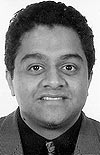 An
International Conference on Environmental Law and Justice will be held
at Stockholm University, 6–9 September 2006. The
conference is organised by Stockholm
Environmental Law and Policy Centre, Among the invited speakers – scholars,
judges, ambassadors etc. from all over the world – Associate
Professor Bharat Desai, School of International Studies, Jawaharlal
Nehru University, New Delhi, India will speak about ”Environmental
Justice in International Law-making Processes”. Prof. Balakrishnan
Rajagopal (photo to the left), Associate Professor of Law
and Development and Director for the MIT Program on Human Rights and
Justice, will speak about ”Rights-talk versus Justice-Talk in
Environmental Governance”. More
information.
An
International Conference on Environmental Law and Justice will be held
at Stockholm University, 6–9 September 2006. The
conference is organised by Stockholm
Environmental Law and Policy Centre, Among the invited speakers – scholars,
judges, ambassadors etc. from all over the world – Associate
Professor Bharat Desai, School of International Studies, Jawaharlal
Nehru University, New Delhi, India will speak about ”Environmental
Justice in International Law-making Processes”. Prof. Balakrishnan
Rajagopal (photo to the left), Associate Professor of Law
and Development and Director for the MIT Program on Human Rights and
Justice, will speak about ”Rights-talk versus Justice-Talk in
Environmental Governance”. More
information.
• Legal Pluralism, Conflicts and
Human Rights in Asia theme for NORASIA IV
The Fourth Norwegian
Research Conference on Asia, NORASIA IV, will be held at Sundvolden
Hotell, Ringerike, 8–10 September
2006. The main theme for the conference, organized by the
Norwegian Network for Asian Studies, will be ”Legal Pluralism,
Conflicts and Human Rights in Asia”. Among the organisers
are Prof. Pamela Gwynne Price, Dept. of History, Oslo University, member
of SASNET’s board. The key speakers at the conference will be
Marc Galanter from University of Wisconsin, USA, and Keebet von Brenda-Beckmann,
Max Planck-Institut, Halle, Germany. More
information.
• New Delhi workshop about Water,
Law and the Commons
A workshop
entitled ”Water,
Law and the Commons”
will be held in New Delhi 8–10 December 2006. It
is organised by the International Environmental Law Research Centre
(IELRC), based in Geneva, Switzerland. IELRC is currently implementing
a 3-year research project entitled 'Legal Issues Related to Water
Sector Restructuring: Human Rights, Environment, Agriculture and
Socio-Economic Aspects', and the workshop is part of this project.
Papers are invited from all academics, policy makers and activists
working across the spectrum of water law; water resources conservation;
and water and environment related issues. More
information.
• Competing
Narratives theme for the 21st Pakistan Workshop 2007
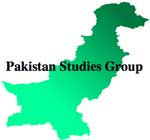 The 21st Pakistan Workshop
will take place at Rook How in the Lake District, UK, 11–13 May
2007.
The theme for the 2007 workshop will be ”Competing Narratives”,
and is supposed to bring together anthropologists and sociologists
whose research involves Pakistan, Pakistani diaspora and South Asian
Islam. These workshops, organised by the Pakistan
Studies Group, normally also attract scholars and researchers from
a broad range of disciplines including historians, political scientists,
economists and applied social scientists. Due to limited places, an
early registration is needed. More information (as
a pdf-file)
The 21st Pakistan Workshop
will take place at Rook How in the Lake District, UK, 11–13 May
2007.
The theme for the 2007 workshop will be ”Competing Narratives”,
and is supposed to bring together anthropologists and sociologists
whose research involves Pakistan, Pakistani diaspora and South Asian
Islam. These workshops, organised by the Pakistan
Studies Group, normally also attract scholars and researchers from
a broad range of disciplines including historians, political scientists,
economists and applied social scientists. Due to limited places, an
early registration is needed. More information (as
a pdf-file)
• Other conferences connected to South Asian
studies arranged all over the World
See SASNET’s page, http://www.sasnet.lu.se/conferences.html#conf
Important lectures and workshops
• Two
lectures by Rana
P.B. Singh in Oslo
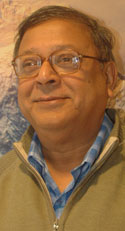 Rana P.B. Singh, Professor of Cultural Geography,
Banaras Hindu University, Varanasi, India, will give two guest lectures
at Oslo University College, Norway,
on Tuesday 30 May 2006. The first lecture (10.00-12.00) will focus
on ”Indian Village:
Social (Caste) System, Changes and Challenges in Education”,
and the second (13.00-15.00) deals with ”Kashi & Cosmos:
Sacred Geography of Banaras”.
Venue: Pilestredet 46, Oslo. More information
about Prof. Singh’s tour to Scandinavia May–June 2006.
Rana P.B. Singh, Professor of Cultural Geography,
Banaras Hindu University, Varanasi, India, will give two guest lectures
at Oslo University College, Norway,
on Tuesday 30 May 2006. The first lecture (10.00-12.00) will focus
on ”Indian Village:
Social (Caste) System, Changes and Challenges in Education”,
and the second (13.00-15.00) deals with ”Kashi & Cosmos:
Sacred Geography of Banaras”.
Venue: Pilestredet 46, Oslo. More information
about Prof. Singh’s tour to Scandinavia May–June 2006.
• Kunda Dixit lectures in Oslo
about the role of mass media in the April revolution in Nepal
The leading Nepalese journalist Kunda Dixit now visits Scandinavia.
On Thursday 1 June 2006, 13.00, he will lecture in Oslo, Norway,
about ”Nepal
– the role of mass media in the April revolution and the
future of free speech”. Kunda Dixit is an international
authority on the press in Asia. He is founder editor and publisher
of the Nepali Times, co-publisher at Himalmedia, and has a Swedish
connection to the Dag Hammarskjöld
Foundation in Uppsala, where he sometimes participates in seminars.
The lecture in Oslo is arranged by the Norwegian Institute of Journalism.
Venue: Fritt Ord, Uranienborgveien 2 (behind the Royal Castle). More
information (as a pdf-file).
• Oslo seminar about Energy and Security
in Asia: China, India, Oli and Peace
A seminar about ”Energy
and Security in Asia: China, India, Oli and Peace” is held in
Oslo, Tuesday 6 June 2006,
14.15–15.45. The seminar organised by Asianettverket features
Stein Tønnesson and Åshild Kolås from the International
Peace Research Institute, PRIO. They have recently written a report
on this issue for the Norwegian Ministry of Foreign Affairs. Venue:
Main auditorium, SUM, Sognsveien 68, Oslo.
• Rajni Palriwala lectures about Single
parents in The Netherlands
Professor Rajni Palriwala, Delhi School of
Economics, lectures in Oslo about ”A search for love: becoming a single
parent in The Netherlands” on Tuesday 6 June 2006, 14.15–16.00.
The lecture is organised by the Dept.
of Social Anthropology, University of Oslo. Palriwala is a sociologist
who has done research on various themes pertaining to gender, particularly
in the areas of kinship and family, women’s work, and women’s
movements, building on her fieldwork in rural Rajasthan, Delhi, and
The Netherlands. Her publications include ”Care, culture and
citizenship: Revisiting the politics of welfare in the Netherlands” (2005,
with Carla Risseeuw and Kamala Ganesh). Venue: Room 648, 5th floor,
Eilert Sundts hus (SV-bygget), Blindern, Oslo. More
information by e-mail.
South Asia related culture in Scandinavia
•
Documentary films about India screened at Göttingen
International Film Festival – and in Bergen
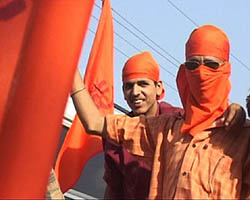 Several documentary films
about India are screened at the 8th Göttingen
International Film Festival in Göttingen, Germany, 24–28
May 2006. As before, the film festival is organized by IWF Knowledge
and Media Institute, and is open to all filmmakers, but especially those
from Anthropology, Sociology, Folklore and neighbouring disciplines.
The India related films to be shown are: Hammer and Flame by
Vaughan Pilikian, on the maritime graveyards of Northern India where
ocean liners are broken down piece by piece in an unending labour using
only the simplest tools (Great Britain 2005); The Age of Reason by
David MacDougall (Australia 2004); July Boys (From the Coding Culture
Series) by Gautam Sonti (India 2006); Final Solution (Part
one) by Rakesh Sharma (scene from the film on photo above),
documenting the changing face of right-wing politics in India through
a study of the 2002 genocide of Muslims in Gujarat (India 2004); and Notes
From the Crematorium by R.P. Amudhan (India 2005). Venue: IWF premises,
Nonnenstieg 72, Göttingen.
Some of these films will also be screened at the Nordic
Anthropological Film Association (NAFA) 26th International Film
Festival, held in Bergen, Norway 8–10 June 2006.
Several documentary films
about India are screened at the 8th Göttingen
International Film Festival in Göttingen, Germany, 24–28
May 2006. As before, the film festival is organized by IWF Knowledge
and Media Institute, and is open to all filmmakers, but especially those
from Anthropology, Sociology, Folklore and neighbouring disciplines.
The India related films to be shown are: Hammer and Flame by
Vaughan Pilikian, on the maritime graveyards of Northern India where
ocean liners are broken down piece by piece in an unending labour using
only the simplest tools (Great Britain 2005); The Age of Reason by
David MacDougall (Australia 2004); July Boys (From the Coding Culture
Series) by Gautam Sonti (India 2006); Final Solution (Part
one) by Rakesh Sharma (scene from the film on photo above),
documenting the changing face of right-wing politics in India through
a study of the 2002 genocide of Muslims in Gujarat (India 2004); and Notes
From the Crematorium by R.P. Amudhan (India 2005). Venue: IWF premises,
Nonnenstieg 72, Göttingen.
Some of these films will also be screened at the Nordic
Anthropological Film Association (NAFA) 26th International Film
Festival, held in Bergen, Norway 8–10 June 2006.
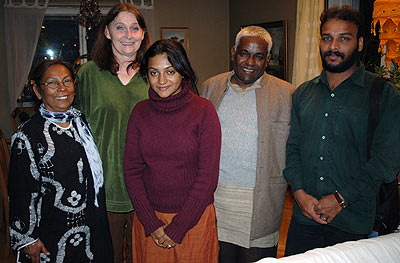 |
| The Kuttiyattam actress Kapila Nangiar in the centre, surrounded by Bubu Munshi-Eklund, Margareta Larsson from Sagohuset, the Director of Natana Kairali Mr. Gopal Venu, and the drummer Kalamandalam Rajeev. Lund, May 4, 2006. |
• Successful Kuttiyattam performances
in Lund
The Kutiyattam dance troupe from the Natana Kairali
Research and Performing Centre for Traditional Arts in Irinjalakuda,
Thrissur District, Kerala, India, again visited Sweden in May 2006.
This time the Natana Kairali dance troupe gave two successful public
performances of the play ”Pudhana Moksham”,
a well-known story about how king Kamtsa tried to kill the god child
Krishna, at Teater Sagohuset in Lund, Saturday 6 May and Sunday 7 May.
Two seminars/workshops with the group’s artistic leader, Mr Gopal
Venu, were also arranged on the same days, in the afternoon.
This is the same dance troup that
visited Sweden in the summer 2005, and gave four performances of the
ancient Sanskrit drama Sakuntala in the Wooden Theatre of Järvsö in
Hälsingland.
From Lund the group has proceeded to Finland, where
they again performed Sakuntala at a theatre festival in Helsinki. More
information about Natana Kairali Centre .
•
Web site about Himalayan and Mongolian Buddhist Culture
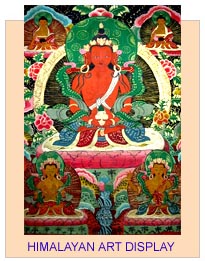 The Tibetan Museum Society is a recently established
non-profit association, dedicated to advocate museum exhibitions
of Asian, mainly Buddhist, art and culture from ancient
Mongolia and the Greater Himalayan Region (including India, Nepal
and Bhutan). Through a broad range of programs and projects, the
Society's two primary focuses are: 1) to provide financial support
to selected museums that enrich the arts with display of historically
significant representations of Buddhist culture and 2) to protect
sacred, religious shrines, from which Buddhist art is gathered for
public sale or display against removal without consent, artifacts
of any kind.
The Tibetan Museum Society is a recently established
non-profit association, dedicated to advocate museum exhibitions
of Asian, mainly Buddhist, art and culture from ancient
Mongolia and the Greater Himalayan Region (including India, Nepal
and Bhutan). Through a broad range of programs and projects, the
Society's two primary focuses are: 1) to provide financial support
to selected museums that enrich the arts with display of historically
significant representations of Buddhist culture and 2) to protect
sacred, religious shrines, from which Buddhist art is gathered for
public sale or display against removal without consent, artifacts
of any kind.
Delgermaa Dagva-Hatchell is the Executive Director of
the Tibetan Museum Society, based in Alexandra, Virginia, USA. The
web site provides on-line access to photos of museum exhibition items
around the World, books and articles on relevant issues, and even
an Himalayan Internet shop. Go
to the Tibetan Museum Society’s web site.
New and updated items on SASNET web site
• More Swedish departments where research
on South Asia is going on:
Constantly added to the list of research environments at Swedish
universities, presented by SASNET. The full list now includes 187 departments! Go
to the presentation page
ƒ School of Engineering, Borås University College
ƒ Läkarprogrammet, the Sahlgrenska Academy, Göteborg University
ƒ Natural Sciences, Physical Education and Mathematics, School of Education and Communication (HKL), Jönköping University
ƒ School of Business, Kalmar University
ƒ Dept. of Media and Communication Studies (MKV), Faculty of Economics, Communication and IT, Karlstad University
ƒ Dept. for Nursing (Sjuksköterskeprogrammet), Karolinska Institutet Medical University, Stockholm
ƒ Centre for Geographical Information Systems, Dept. of Physical Geography and Ecosystem Analysis, Lund University
ƒ School of Technology and Society, Malmö University
ƒ School of Life Sciences, Skövde University
ƒ Dept. of Mechanical Engineering, School of Technology and Design, Växjö University
ƒ Legal Science (Rättsvetenskap), Dept. of Behavioural, Social and Legal Sciences, Örebro University
ƒ Dept. of Clinical Medicine, Örebro University
ƒ Sociology; Department of Social and Political Sciences, Örebro University
• Several new articles recommended for reading
Look at http://www.sasnet.lu.se/recreading.html
for suggestions on interesting new articles on South Asia in International
media. Many new items added, especially on Pakistan, India, and the South
Asia region.
Best regards,
Staffan Lindberg Lars Eklund
SASNET/ Swedish South Asian Studies Network
SASNET is a national network
for research, education, and information about South Asia, based at Lund
University. The aim is to encourage and promote an open and dynamic networking
process, in which Swedish researchers co-operate with researchers in South
Asia and globally.
The network is open to all sciences. Priority is given to co-operation
between disciplines and across faculties, as well as institutions in the
Nordic countries and in South Asia. The basic idea is that South Asian
studies will be most fruitfully pursued in co-operation between researchers,
working in different institutions with a solid base in their mother disciplines.
The network is financed by Sida (Swedish
International Development Cooperation Agency) and by Lund
University.
Postal address: SASNET – Swedish South Asian Studies Network,
Scheelevägen 15 D, S-223 70 Lund, Sweden
Visiting address: Ideon Research Park, House Alfa 1 (first floor,
room no. 2040), in the premises of the Centre for East and South East
Asian Studies at Lund University (ACE).
Phone: + 46 46 222 73 40
Fax: + 46 46 222 30 41
E-mail: sasnet@sasnet.lu.se
Web site:
http://www.sasnet.lu.se
Staff: Staffan
Lindberg, director/coordinator & Lars
Eklund, webmaster/deputy director
SASNET - Swedish South Asian Studies Network/Lund
University
Address: Scheelevägen 15 D, SE-223 70 Lund, Sweden
Phone: +46 46 222 73 40
Webmaster: Lars Eklund
Last updated
2011-05-19